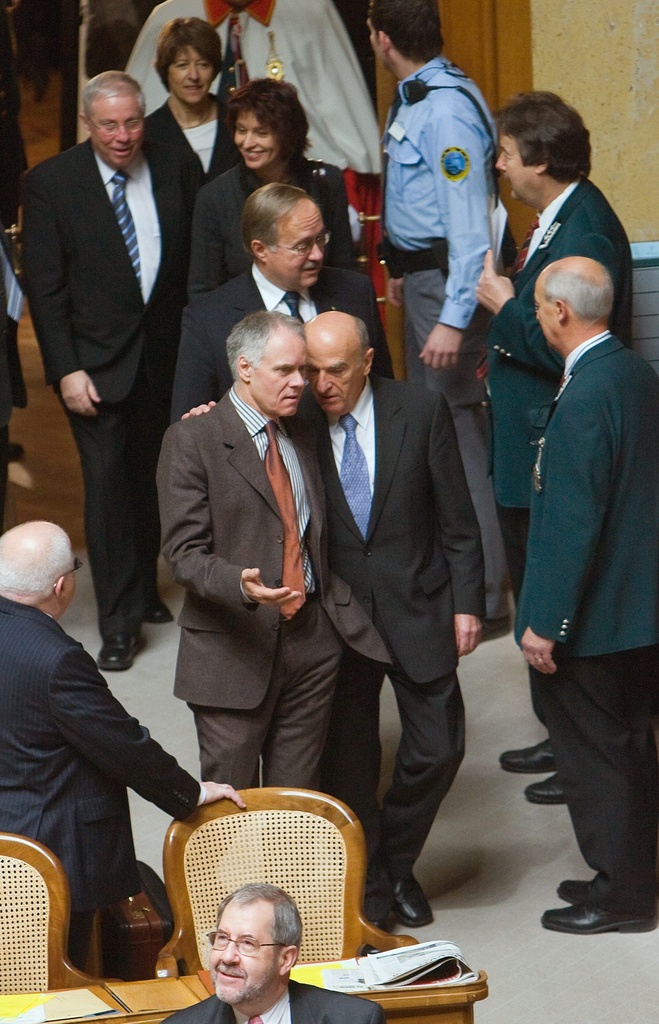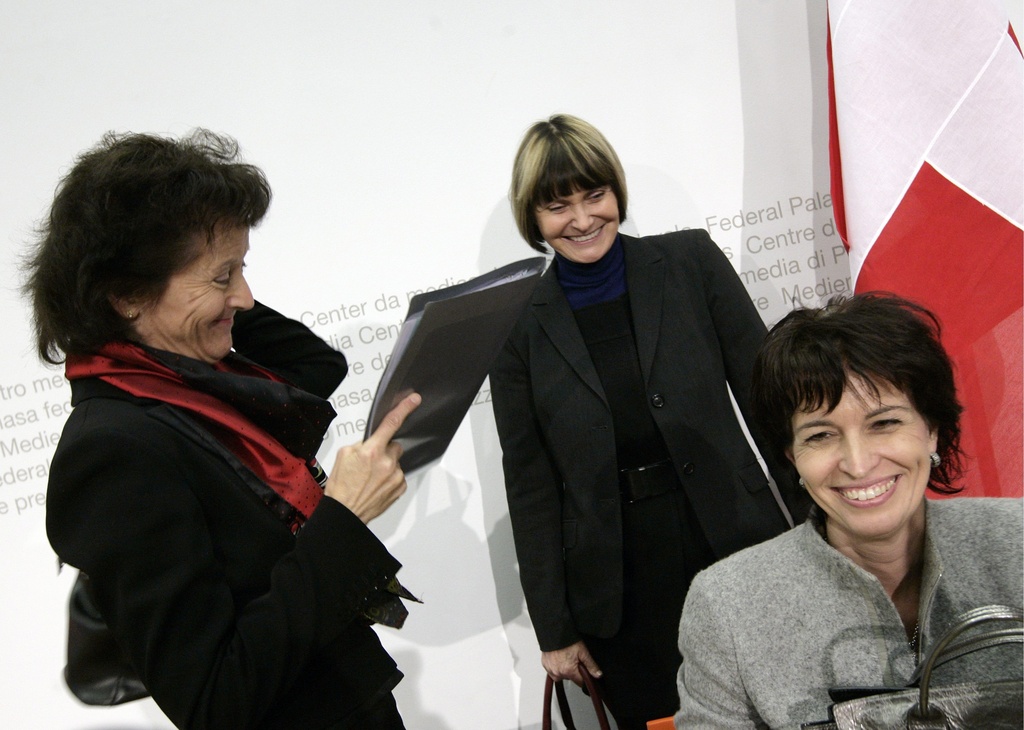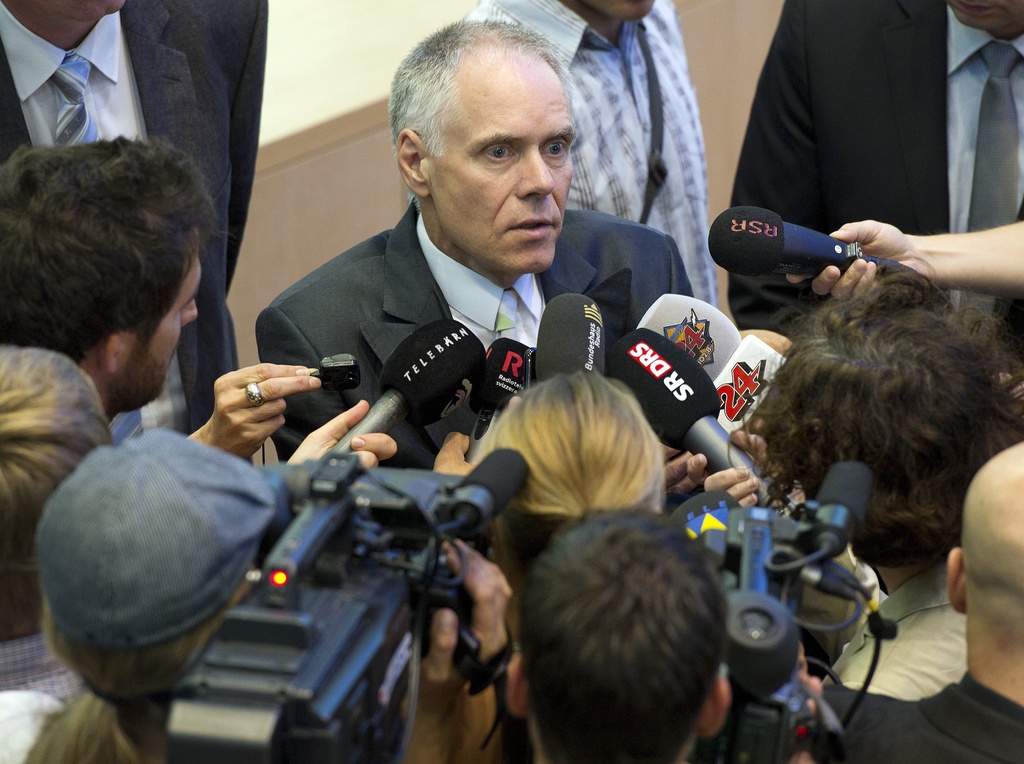Cabinet prepares for musical chairs

Elections to replace one or possibly two cabinet members will be high on Switzerland’s political agenda in the coming months.
An increasing polarisation of the political climate and shifting informal alliances over the past few years have broken up a traditional pattern in force for nearly 50 years.
The main political parties are entitled to a proportional share of the seats in the seven-strong cabinet according to an informal agreement reached in 1959.
This deal, known as the Magic Formula, ensures access to government powers for the four main parties without too much controversy.
However, the era appeared to come to an end seven years ago when a rightwing party took a second set at the expense of a centre-right party.
Currently, the centre-left Social Democrats and the centre-right Radicals have two seats each, the rightwing Swiss People’s Party, a more moderate split-off, the Conservative Democratic Party, and the other main centre-right Christian Democratic Party have one seat each.
Since the 2003 elections a period of relative instability in the make-up of the government has defined the climate. It is also expected to mark next year’s parliamentary elections and the years to come.
But this is no reason for undue concern, according to Georg Lutz, a political scientist at Lausanne University.
“Switzerland has fared well compared with other countries despite constant criticism of the political system and the cabinet in particular,” he told swissinfo.ch.
Lutz pointed out that the country managed the global economic downturn of the past two years much better than others.
Tactics
Nonetheless there has been a fair amount of speculation about possible candidates and political games between the various parties in an effort to retain their seats.
The Swiss People’s Party, parliament’s biggest party, launched the race with an expected challenge to the seat of the outgoing Transport Minister Moritz Leuenberger, a member of the Social Democratic Party.
However, experts say the claim by the rightwingers is unlikely to be heeded at this stage.
For their part, the Radicals, who might have to replace embattled Finance Minister Hans-Rudolf Merz soon, are facing difficult times.
As they are not expected to do well in the 2011 parliamentary elections, they could struggle to justify their two seats in the cabinet.
They could be well advised to seek an understanding with the Social Democrats over candidates for the government.
“It is a somewhat obvious option,” Lutz said.
The tactical games of the parties have become ever more complicated and unpredictable.
“Almost every cabinet election in the recent past has been decided by a handful of votes,” he added.
Timetable
Leuenberger, 63, is yet to officially hand in his resignation to parliament, expected in September. His successor would take over at the beginning of next year.
Merz, 67, who so far has ignored pressure from the media over his political performance of late, could still leave government before Leuenberger by making the long-awaited announcement in the days before the next parliament session, due to open on September 13.
The hapless finance minister said he would serve out his second four-year term to the end of 2011. But statements by leaders of his Radical Party could help pave the way for Merz to change his mind – in which case both chambers of parliament will have to decide on a successor during the three-week autumn session.
In another political shift, many commentators have noted that as the two favourites to replace Leuenberger are women, there could soon be four women in the seven-member cabinet.
This would make Switzerland only the second European country to have a female cabinet majority and would come less than 40 years after women got the vote.
In any case, each of the seven cabinet ministers has to be confirmed in December 2011 following parliamentary elections in October of the same year.
Armando Mombelli, swissinfo.ch (Adapted from Italian by Urs Geiser)
Swiss People’s Party: 28.9%
Social Democratic Party: 19.5%
Radical Party: 15.6%
Christian Democratic Party: 14.6%
Green Party: 9.6%
Conservative Democratic Party: founded after 2007
Swiss cabinet ministers do not answer to their parties and there is no possibility to impeach them.
They are free to choose the moment of their resignation themselves and they enjoy a considerable autonomy in the cabinet.
The cabinet comes up for confirmation every four years in the wake of parliamentary elections.

In compliance with the JTI standards
More: SWI swissinfo.ch certified by the Journalism Trust Initiative






You can find an overview of ongoing debates with our journalists here. Please join us!
If you want to start a conversation about a topic raised in this article or want to report factual errors, email us at english@swissinfo.ch.